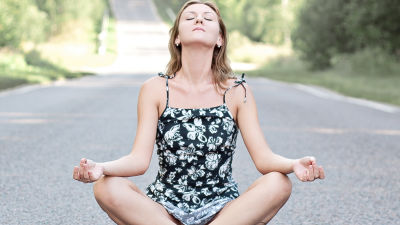Research shows that meditation and yoga lower blood pressure and physically reduce stress

by
There are various claims about the effects of meditation, mindfulness, and yoga, and while it is said that they help you let go of your ego, research has shown that ego increases significantly after meditation and yoga . New research has focused on the effects on the body, showing that meditation and yoga lower blood pressure and reduce stress hormone levels.
Mindfulness mediates the physiological markers of stress: Systematic review and meta-analysis - ScienceDirect
https://www.sciencedirect.com/science/article/pii/S0022395617301462
It's not all in your mind: how meditation affects the brain to help you stress less
https://theconversation.com/its-not-all-in-your-mind-how-meditation-affects-the-brain-to-help-you-stress-less-97777
Previous studies have shown that meditation and yoga reduce stress and anxiety based on self-reported measures, partly due to their effects on the brain's stress response system.
The body's stress response is controlled by the autonomic nervous system , which consists of the sympathetic and parasympathetic nervous systems . The sympathetic nervous system is activated during strenuous activity and controls the muscles, organs, and glands to 'fight' or 'flight' in order to free a person from a stressful or threatening situation. This is also known as the ' fight or flight' response .
On the other hand, the parasympathetic nervous system counteracts the action of the sympathetic nervous system and returns the body, which has been activated by the sympathetic nervous system, to a normal state.
In many cases, the sympathetic and parasympathetic nervous systems have opposite functions: For example, the sympathetic nervous system increases heart rate, blood pressure, and secretes stress hormones such as cortisol , while the parasympathetic nervous system does the opposite, decreasing heart rate, blood pressure, and cortisol levels.
Michaela Pascoe, a postdoctoral researcher at the University of Victoria in Canada, focused on the functions of the sympathetic and parasympathetic nervous systems and investigated how yoga and meditation affect heart rate and blood pressure. Pascoe and her team conducted a meta-analysis of 45 previously conducted studies to systematically re-evaluate them. They also investigated how different types of meditation affect the body.

By
First, Pascoe looked at three different meditation techniques in his research:
◆Insight meditation (open monitoring)
Insight meditation involves paying attention to what you are experiencing and observing all aspects of that experience without criticizing or endorsing it, which allows you to recognize your own cognitive and emotional patterns.
◆ Focused attention
Concentration meditation aims to increase the meditator's concentration by focusing on one thing. The object of concentration can be varied, such as breathing, a mantra , a part of the body, or an 'object' in the real world. Each time the meditator realizes that their attention has been distracted, they repeatedly focus on the 'object.'
◆Automatic Self-Transcending Meditation
Self-transcendental meditation is said to be an effortless way to concentrate by meditating while chanting Sanskrit mantras. As you become more self-aware through meditation, you will eventually stop chanting the mantra. Self-transcendental meditation is generally done with your eyes closed for 15 to 20 minutes twice a day.
The study found that people who meditated or practiced yoga had diastolic blood pressure (lower blood pressure) that was 3 to 8 millimeters of mercury (mmHg) lower than those who engaged in aerobic exercise or relaxation activities.

by Designecologist
In addition, people who practiced concentration meditation and self-transcendental meditation had systolic blood pressure (upper blood pressure) 4 to 5 mmHg lower than those who did not practice yoga or meditation. This result is important because it is said that even a 2 mmHg reduction in diastolic or systolic blood pressure can reduce the incidence of heart disease and stroke, Pascoe said.
Additionally, insight meditation, concentration meditation, and yoga have been found to reduce heart rate by 3 to 4 beats per minute, and concentration meditation and yoga have been found to lower cortisol levels.
The study showed that all three types of meditation reduced physical stress in some way. When asked which method is best, Pascoe said, 'You should choose one that you enjoy practicing and can do consistently and regularly.'
Related Posts:
in Science, Posted by darkhorse_log







